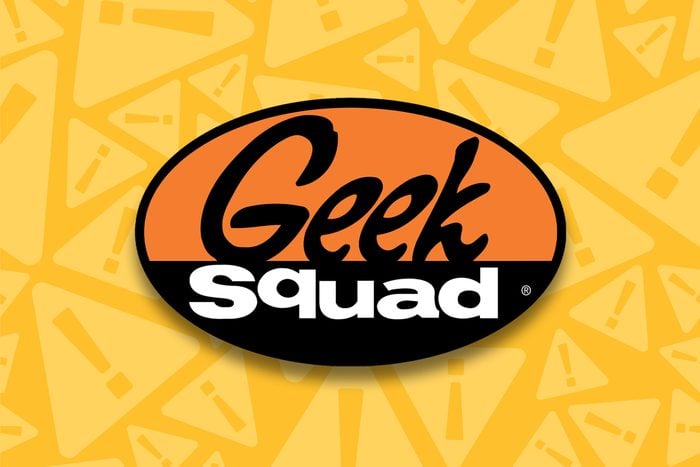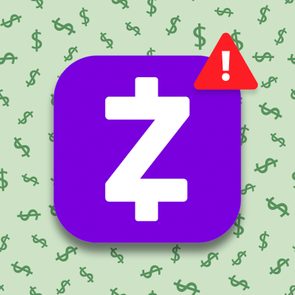What Is the Geek Squad Scam, and How Can You Avoid It?
Updated: Feb. 01, 2024

The clever Geek Squad scam comes in eight different varieties. Here are the red flags everyone needs to know.
Internet scams are a booming business. In 2021, the United States saw the highest number of complaints—nearly 1 million—and the greatest amount of money lost—$6.7 billion—according to the most current crime report from the Federal Bureau of Investigation. Of these, tech support scams, including the Geek Squad scam, are some of the costliest, bilking Americans out of $350 million last year. (In fact, one elderly New Jersey woman lost an eye-popping $98,577 to scammers posing as members of the famous tech support team.)
Why is the Geek squad scam so popular? In short, because it’s one of the simplest scams to perpetrate, costs nearly nothing to run, has endless variations and has a very low chance of the criminal getting caught, explains Matt Hathaway, a cybersecurity expert and the chief marketing and strategy officer at TrueFort, a cybersecurity company. “It’s low risk, high reward,” he says. “It’s cheap and easy to send the slightly customized email to hundreds or thousands of people and wait until someone responds.”
Read on for crucial information about Geek Squad scams.
Get Reader’s Digest’s Read Up newsletter for more tech, humor, cleaning, travel and fun facts all week long.
On This Page
What is Geek Squad?
If you’ve ever shopped at Best Buy, you’ve probably come across the Geek Squad, a team of technology professionals who provide on-demand support for people who purchase an extra tech support subscription plan when buying electronics from Best Buy. Because the store and its tech team are so well known, the Geek Squad scam is a go-to con for tech support scammers.
What is the Geek Squad scam?
The Geek Squad scam is a type of impersonation scam in which the criminal impersonates a tech support professional from a large, recognized and trusted company (in this case, Best Buy) to get money out of victims.
“It works because Geek Squad is a widely used service across the country, so someone is sure to take the bait and fall for the scam,” says Oliver Noble, a cybersecurity expert at NordLocker, a company that secures information in the cloud.
How the Geek Squad scam works
There’s no single version of the Geek Squad email scam, which is one reason so many people fall for it. But the end goal is always the same: to get money and/or information out of you via trickery and deceit.
A scammer will contact you using a phony Geek Squad scam email, text or phone call. (Keep in mind, emails and phone numbers can be spoofed to look like they are from the Geek Squad when they are not.) The message will give you some reason to get back to them. Once you do, the scammers will ask you to make a payment, give them account information or provide access to your device, at which point they’ll install malware and siphon off personal information.
Protect yourself by familiarizing yourself with the following eight ways fraudsters employ Geek Squad scams.
Auto-renewal scams
The Geek Squad email renewal scam starts with a bogus email or text that says your Geek Squad subscription is being automatically renewed for some exorbitant amount of money, usually around $400, and charged to your credit card. If the renewal is a mistake, the message says, call the provided number—supplied by the scammer, naturally—within 24 hours, and Best Buy will cancel the subscription for a small fee.
Everyone is fair game for this scam. It doesn’t matter whether you currently have, used to have or have never had an account with the Geek Squad.
Security support scams
When surfing the internet, you see a flashing pop-up that tells you your computer has been infected with hacking software or a virus. You must call the Geek Squad at the number on the screen—provided by the scammer—to get it fixed. Once you do, they’ll charge you a lot of money to “fix” a problem you never had.
Malware scams
Here’s a surefire way to identify a scammer: Some security support scams will ask you to download special software that will allow the Geek Squad tech to see your computer, diagnose the problem and fix it remotely. What this software actually does is give the scammer access to your entire system, where they can steal any information you have stored.
Ransomware scams
To add insult to injury, once you’ve installed the scammer’s software and they’ve remotely taken over your device, they may ask you to pay them a fee to unlock your information. They usually ask for payment in untraceable gift cards.
Tech support scams
You get a bogus email offering free or discounted tech support services from the Geek Squad as a thank-you for being such a loyal customer. When you call to set up the appointment, the customer service rep will ask for your credit card—just to book the service. Except that’s not a customer service rep, you’re not talking to Best Buy and you don’t get support. Scammers, however, get your money.
Accidental overpayment scams
You get an urgent email saying you’ve overpaid for a service and are owed a refund. You don’t remember buying anything from the Geek Squad, but hey, who doesn’t want more money? Once you call the (fake) number, the Best Buy representative will offer to send you the money. The catch: You first have to pay a small fee, often with gift cards.
Phishing scams
An official-looking email from Best Buy pops up in your inbox, saying the Geek Squad system has been hacked. The company is asking all of its customers to log in to their accounts and verify that their information is still correct. Another version of the Geek Squad phishing email asks you to reset your Best Buy password for security purposes.
These may sound legit, but everything about these emails is a scam, from the so-called hack to the supposedly legitimate links. In fact, the links included in these emails take you to a fake site that then steals your personal information when you enter it.
Recovery scams
Once the scam is completed and you realize you’ve lost your money and/or your personal data, you may feel desperate to get it back. Scammers know this, so the person who defrauded you (or a close associate) may reach out to you again. They’ll pretend to be someone from the real Geek Squad who can fix it or reclaim your lost items, money and other details—for a fee.
Don’t fall for the ruse! These recovery scammers will just take more of your money and disappear.
Red flags of the Geek Squad scam

First, it’s important to know and learn to recognize the hallmarks of nearly all scams, including romance scams, Amazon scams and bank scams, says Hathaway. Those include the following characteristics.
Provoking a strong emotion
It’s easier to manipulate you if you’re very excited, scared, angry or greedy. In such heightened states of emotion, you’ll be less suspicious and more willing to overlook other red flags.
Creating urgency
If you feel like you have to act fast to avoid getting charged or losing your information, you’ll be more likely to ignore your instincts.
Offering a deal that’s too good to be true
Scammers prey on greed, and they know that offering you something like free money or services is a great way to get you to do things you otherwise wouldn’t. That’s true for crypto scams, OfferUp scams and, yes, the Geek Squad scam.
Including confusing or inaccurate details
Scammers often don’t take the time to make sure that all the details line up and will use bogus information, banking on the hope that you won’t verify it. And you may not—phone numbers and emails can be spoofed to look like they’re from legitimate companies, after all.
Geek Squad scams are relatively easy to spot, once you know what to look for, says Noble. These red flags are clear tip-offs that you’re dealing with a scammer:
-
The message has a generic greeting and doesn’t use your name.
-
The return email address uses a Gmail, Yahoo Mail or other nonofficial account.
-
Logos, phone numbers, email addresses and other information doesn’t match the company’s official site.
-
You haven’t purchased anything from Best Buy recently and/or you don’t have a Geek Squad subscription.
-
The person threatens you. Suffice to say, no company (including Best Buy) will issue threats.
-
The message is filled with bad grammar and spelling. Such mistakes are uncommon in information from large corporations, which double-check all their communications.
-
The message uses the word “kindly” often. For whatever reason, scammers love to use the word “kindly,” even though professional English communications almost never use it.
-
You’ve received unsolicited communication. You may get ads from the Geek Squad, but it won’t reach out to you unsolicited to ask for your personal or payment information.
-
The Geek Squad reaches out to you via social media, WhatsApp, text or other nonofficial communication channels. Official Geek Squad business always goes through official Geek Squad email accounts and phone numbers.
-
The message asks for payment in gift cards. Best Buy and the Geek Squad will never do this.
How to avoid getting scammed
The experts say there are smart steps you can take to avoid falling victim to the Geek Squad scam, including the following:
-
Do not give anyone any passwords, usernames, phone numbers, social security numbers, verification codes (a key element of Google Voice scams, by the way) or credit card numbers via text or email.
-
Always go to the website yourself rather than clicking a link in an email or text.
- Never call the number in a web page’s pop-up window.
-
If you’re unsure of the legitimacy of an email, text or phone call, go to the Geek Squad or Best Buy website, look up the customer service number and call it yourself. Never respond with questions for the scammer.
-
Don’t download any unknown software onto your computer or phone.
-
Never make a payment with gift cards.
As a rule of thumb, stay skeptical and make people earn your trust, says Hathaway.
“The best way to avoid scammers is to treat everyone that is asking for personal information online as a scammer, even if they are a person you know well, because it is extremely easy to create fake emails, phone numbers, social media profiles and even websites that look identical to real ones,” says Noble. “Always be on guard.”
Sources:
- Matt Hathaway, cybersecurity expert and chief marketing and strategy officer at TrueFort
- Oliver Noble, cybersecurity expert at NordLocker
- Federal Bureau of Investigation: “Internet Crime Report 2021”
- Federal Bureau of Investigation: “FBI Chicago Warns of Local Technical Support Scam”
- WFMJ: “Mercer County Woman Loses $98K to ‘Geek Squad’ Scam”
- Best Buy: “Learn How to Protect Yourself and Your Loved Ones Against Cybercrime and Fraud Scams.”



